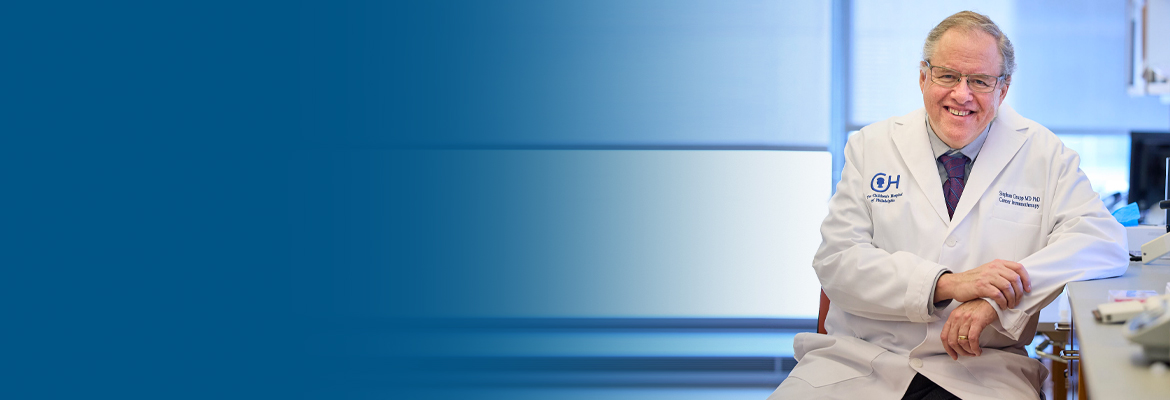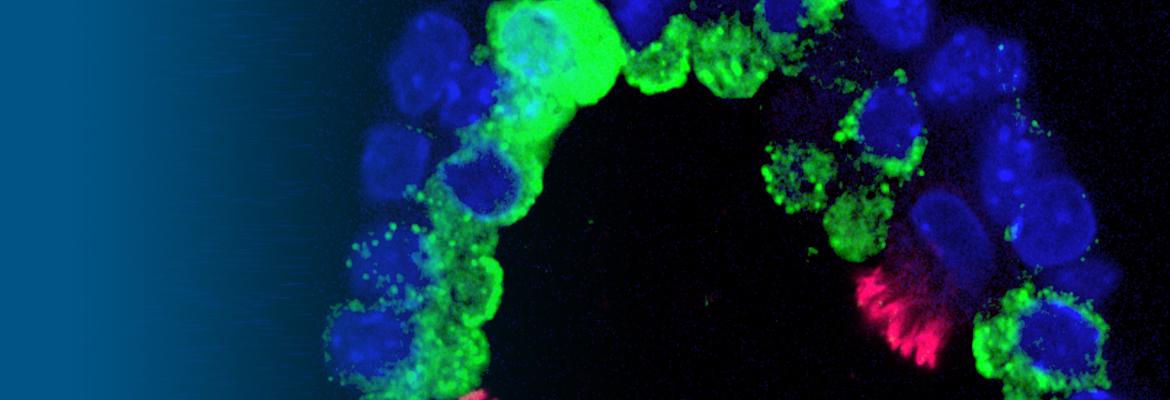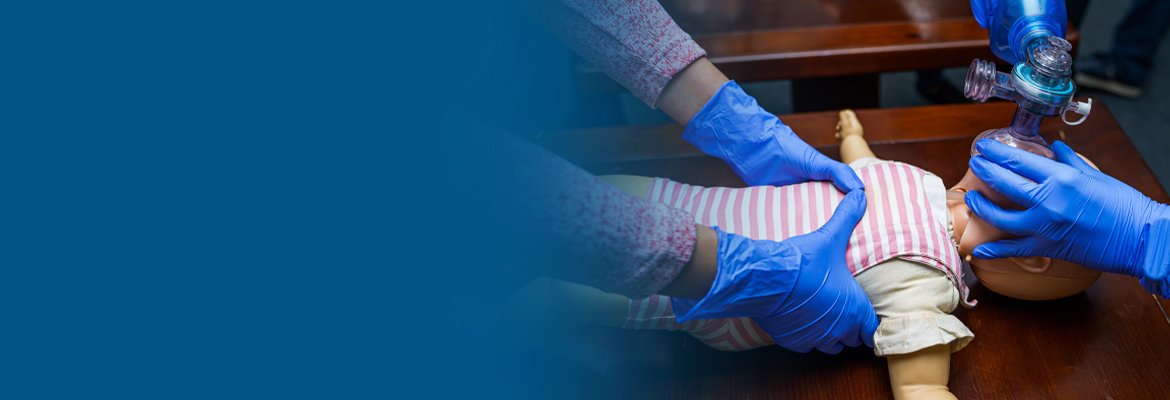HOW CAN WE HELP YOU? Call 1-800-TRY-CHOP
Collaboration Accelerates Pace of Scientific Discovery
Transformative Gift
"The Kelly’s unwavering commitment to CHOP and the Cancer Center will allow us to forge ahead and identify new therapies for sick children sooner ..."
The Susan S. and Stephen P. Kelly Center for Cancer Immunotherapy — a first-of-its-kind hub for pediatric cancer immunotherapy — was named in recognition of a transformative gift from Susan and Steve Kelly, local philanthropists and long-time supporters of Children’s Hospital of Philadelphia.
The new Center enables CHOP to create a more robust infrastructure to expand pediatric clinical trials and accelerate the Food and Drug Administration approval of novel treatments; increase the pipeline of innovative therapeutics and diagnostics; recruit and train top investigators and postdoctoral researchers to become the next generation of cancer immunotherapy experts; and increase equity and access to cell therapy clinical trials for socioeconomically disadvantaged patients. The inaugural leader of the Center is Stephan Grupp, MD, PhD, director of Translational Research of CHOP’s Center for Childhood Cancer Research.
“Cell and gene therapy is a major emphasis at CHOP. With this significant investment from Steve and Susan, CHOP is now positioned, unlike any other academic medical center, to leverage our clinical and scientific expertise in the cell and gene therapy space to better care for pediatric patients and families in Philadelphia and around the world,” said Dr. Grupp, a pioneer of the first cellular immunotherapy in childhood cancer. “The Kelly’s unwavering commitment to CHOP and the Cancer Center will allow us to forge ahead and identify new therapies for sick children sooner, bringing us one step closer to our ultimate goal: prescribing every child diagnosed with cancer a targeted therapy based on their genetic makeup, their cancer’s makeup, and the makeup of their own immune system.”
Improving Environmental Health
"This Center will build on years of extensive research in environmental toxicology and pediatric health at both Penn and CHOP to make real, positive change in the lives of children throughout the region."
As one of the poorest large cities in the nation, Philadelphia faces numerous environmental threats to children’s health, including lead poisoning, air pollution, and exposure to asbestos. Addressing these environmental hazards and protecting the children who live in the region’s most vulnerable communities is the new Philadelphia Regional Center for Children’s Environmental Health. The Center will provide the infrastructure to integrate expertise from researchers at Children’s Hospital of Philadelphia and Penn Medicine, along with colleagues from other area colleges and universities.
“This Center will build on years of extensive research in environmental toxicology and pediatric health at both Penn and CHOP to make real, positive change in the lives of children throughout the region,” said the Center’s co-director Rebecca Simmons, MD, a neonatologist at CHOP and professor of Pediatrics in the Perelman School of Medicine at the University of Pennsylvania. “We already have many established connections within communities throughout Philadelphia, Delaware, and other counties, and this grant will allow us to strengthen and expand on those partnerships.”
Neuroscience Center Launches
"Our team focuses on every aspect of neurology and neurosurgery, including rare diseases."
The Neuroscience Center at Children’s Hospital of Philadelphia brings together the Divisions of Neurology and Neurosurgery — consistently ranked among the top 10 pediatric programs in the nation by U.S. News & World Report — creating a partnership of innovative clinical care, education, and research.
The Center aims to deliver the most comprehensive care for patients with acute or chronic neurological or neurosurgical conditions, including rare diseases, and elevate CHOP as the national resource for clinical neuroscience discovery.
“Our Center’s collaborative and comprehensive structure optimizes our ability to provide the individualized, world-class clinical care patients need,” said Neuroscience Center Co-director Brenda Banwell, MD, chief of the Division of Neurology. “We continue to accelerate our pace toward groundbreaking discoveries, including clinical trials, biomarkers, tissue genomics, outcomes research, cell and gene therapies, and neuroimaging research partnerships. Our team focuses on every aspect of neurology and neurosurgery, including rare diseases.”
Improving Pediatric Cardiovascular Care
"Channeling the expertise of these top basic and translational scientists, we will drive cardiovascular research forward to improve our understanding and treatment of pediatric cardiovascular disease."
The new Children’s Hospital of Philadelphia Cardiovascular Institute (CVI), led by Daniel Kelly, MD, will develop novel research programs and partner with existing programs in the Penn Cardiovascular Institute, of which Dr. Kelly is also director. Harnessing the collective power of CHOP and Penn Medicine, the CHOP CVI drives scientific discovery and medical breakthroughs that will improve pediatric cardiovascular care.
“It is a privilege to lead this new Institute, which will bring together top researchers from Penn and CHOP to solve some of pediatric cardiology’s greatest challenges,” Dr. Kelly said. “Channeling the expertise of these top basic and translational scientists, we will drive cardiovascular research forward to improve our understanding and treatment of pediatric cardiovascular disease.”
Evidence-based Resuscitation Practices
"With this philanthropic support, we are one step closer to eliminating disparities in outcomes by providing evidence-based, optimal resuscitation practices in hospitals in communities all over the world."
With a gift from the Asmund Laerdal Foundation and RQI Partners LLC, a partnership between the American Heart Association and Laerdal Medical, Children’s Hospital of Philadelphia is developing the Academy for Resuscitation of Children (ARC), the implementation science wing of the Resuscitation Science Center, where the next generation of interventions are being discovered to improve survival and outcomes for children.
As an in-person and virtual international training center, ARC will adapt, implement, and disseminate evidence-based resuscitation guidelines to healthcare centers around the globe. ARC will support this new Global Resuscitation Alliance with the first 10-step approach to high performance pediatric in-hospital resuscitation practice, based on pioneering innovation and research, exceptional training, extraordinary care, and genuine collaboration,
“With this philanthropic support, we are one step closer to eliminating disparities in outcomes by providing evidence-based, optimal resuscitation practices in hospitals in communities all over the world,” said ARC founding director Vinay Nadkarni, MD, an international leader in the development and implementation of critical care and resuscitation science in both resource-rich and resource-poor environments.
Accelerating Pace of Discovery
"By bringing pediatric and adult kidney researchers under one umbrella, we will accelerate the pace of discovery for both populations."
In an effort to improve the lives of children and adults with kidney disease, Children’s Hospital of Philadelphia and the University of Pennsylvania jointly launched the Penn-CHOP Kidney Innovation Center. The first-of-its-kind center aims to advance research to transform patient care through a cooperative bench-to-bedside, big data approach to precision medicine, focusing on early detection, prevention, and treatment of kidney disease and its complications.
Scientists in the Kidney Innovation Center will investigate the molecular pathways, genetics, and biochemistry involved in kidney disease and identify targets for potential therapies, by combining their expertise in epidemiology, biostatistics, bioinformatics, computational biology, genetics, pathology, physiology, biochemistry, immunology, genomics, pharmacology, psychology, and education.
“By bringing pediatric and adult kidney researchers under one umbrella, we will accelerate the pace of discovery for both populations,” said co-director Michelle Denburg, MD, MSCE, director of Research for CHOP’s Division of Nephrology. “Some processes of kidney disease are shared in adults and children, and others are unique, but in both cases, promoting crosstalk between researchers can shed light on mechanisms of disease for both children and adults and lead to precise diagnostics and treatments.”





